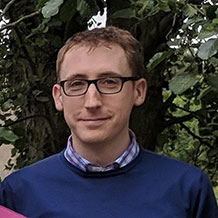Dr Will Brackenbury
Senior Lecturer in Biomedical Sciences
Research
Overview
Our lab explores the role of ion channels in disease, focussing on how aberrant ion channel signalling can alter cell behaviour to promote the progression of solid tumours, including breast cancer. We are particularly interested in voltage-gated sodium channels (VGSCs), and their role in regulating membrane electrical activity, adhesion, cellular migration, and invasion. Our current focus is on understanding the mechanisms by which VGSCs regulate the invasion of metastatic breast cancer cells, promoting metastasis.
Voltage-gated sodium channels and cancer
VGSCs contain a large pore-forming α subunit, together with smaller non-pore-forming β subunits. The β subunits are members of the immunoglobulin superfamily and regulate cell adhesion. VGSC α and β subunits are expressed in a range of different cancers. The Nav1.5 α subunit is expressed on breast cancer cells, where it enhances migration and invasion, and its expression level associates with poor prognosis in breast cancer patients. We have shown that targeting this channel with antiepileptic drugs reduces tumour growth and metastasis in preclinical models, suggesting that repurposing VGSC-inhibiting medications to cancer may hold promise for reducing metastasis.
Sodium handling and the ionic tumour microenvironment
Aberrant sodium channel/transporter expression in cancer cells may be related to the elevated tissue sodium levels reported in solid tumours, including breast cancer. Using 23Na-MRI, we have shown that this elevated sodium predominantly resides in the intracellular compartment, suggesting that altered plasma membrane transport routes, including VGSCs, may be an important mechanism underlying sodium accumulation in breast cancer. Using a combination of preclinical in vitro and in vivo models, together with imaging studies in cancer patients, we are currently investigating how expression of these channels is regulated, and the potential utility of altered sodium as a novel imaging biomarker of malignancy.
Teaching and scholarship
![]()
I am a biomedical scientist with an interest in ion channels and cell signalling in diseases including neurological disorders and cancer. My teaching reflects these research interests.
![]()
I provide undergraduate lectures in stages 2 and 3, in areas covering neuroscience, pharmacology and cancer. I also lead a module on Molecular Basis of Disease which is part of the stand-alone MSc in Molecular Medicine. Throughout, my lectures reflect on and relate to various rapidly developing areas of biomedical science.
![]()
I offer tutorials to stage 1 and stage 2 undergraduate students on the topic of ion channels in health and disease. These typically follow a journal club format in which we cover the topic by studying primary research papers.
![]()
I run laboratory, data analysis and science communication projects for stage 3 and stage 4 undergraduate students as well as students on the stand-alone MSc in Molecular Medicine. The projects always relate closely to our ongoing research in the lab, focusing on ion channels and disease. Techniques include cell culture, biochemistry, microscopy and image analysis.


